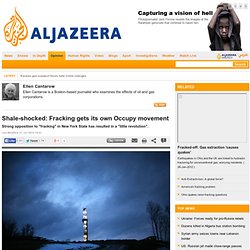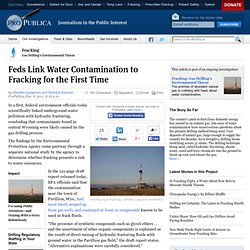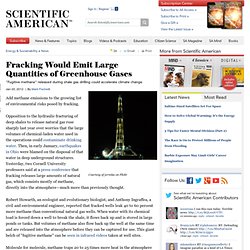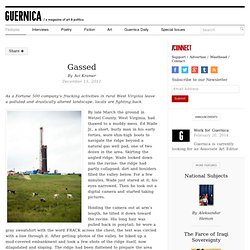

Doctors Call for Fracking Moratorium. Wow, this bit of news is amazing, in both a good and bad way.

Just to mention one fracking contaminant, benzene is a particularly nasty carcinogen (not that this Bloomberg article mentions it, but it is the sort of thing that too often gets into water tables thanks to fracking). The fact that fracking is seen as a big enough public health risk to rally the normally apolitical medical profession (at least as far as measures ex health care reform are concerned) to call for intervention is striking. From Bloomberg: The U.S. should declare a moratorium on hydraulic fracturing for natural gas in populated areas until the health effects are better understood, doctors said at a conference on the drilling process. Gas producers should set up a foundation to finance studies on fracking and independent research is also needed, said Jerome Paulson, a pediatrician at George Washington University School of Medicine in Washington… A top scientist at the U.S.
Shale-shocked: Fracking gets its own Occupy movement. Boston, MA - This is a story about water, the land surrounding it, and the lives it sustains.

Clean water should be a right: There is no life without it. New York is what you might call a "water state". Fracking Hell: The Untold Story. Feds Link Water Contamination to Fracking for the First Time. The EPA’s investigation into water pollution near Pavillion, Wyo., produces landmark findings that could erode arguments used to defend safety of the gas drilling process.

In a first, federal environment officials today scientifically linked underground water pollution with hydraulic fracturing, concluding that contaminants found in central Wyoming were likely caused by the gas drilling process. The findings by the Environmental Protection Agency come partway through a separate national study by the agency to determine whether fracking presents a risk to water resources.
In the 121-page draft report released today, EPA officials said that the contamination near the town of Pavillion, Wyo., had most likely seeped up from gas wells and contained at least 10 compounds [1] known to be used in frack fluids. Environmental advocates greeted today’s report with a sense of vindication and seized the opportunity to argue for stronger federal regulation of fracking. Fracking Would Emit Large Quantities of Greenhouse Gases.
Add methane emissions to the growing list of environmental risks posed by fracking.

Opposition to the hydraulic fracturing of deep shales to release natural gas rose sharply last year over worries that the large volumes of chemical-laden water used in the operations could contaminate drinking water. Then, in early January, earthquakes in Ohio were blamed on the disposal of that water in deep underground structures. Yesterday, two Cornell University professors said at a press conference that fracking releases large amounts of natural gas, which consists mostly of methane, directly into the atmosphere—much more than previously thought.
Robert Howarth, an ecologist and evolutionary biologist, and Anthony Ingraffea, a civil and environmental engineer, reported that fracked wells leak 40 to 60 percent more methane than conventional natural gas wells. When water with its chemical load is forced down a well to break the shale, it flows back up and is stored in large ponds or tanks. Gassed. As a Fortune 500 company’s fracking activities in rural West Virginia leave a polluted and drastically altered landscape, locals are fighting back.

By late March the ground in Wetzel County, West Virginia, had thawed to a muddy mess. Ed Wade Jr., a short, burly man in his early forties, wore shin-high boots to navigate the ridge beyond a natural gas well pad, one of two dozen in the area. Skirting the angled ridge, Wade looked down into the ravine: the ridge had partly collapsed; dirt and boulders filled the valley below. For a few minutes, Wade just stared at it, his eyes narrowed. Then he took out a digital camera and started taking pictures. Holding the camera out at arm’s length, he tilted it down toward the ravine. Wetzel is part of a rugged section of Appalachia just below the Mason-Dixon Line and, in the last few years, has become prime ground for natural gas exploration. Wade put his camera away and looked out toward the horizon, which was settling into dusk. “In what way?” "Don't Frack Me Up" Submitted by Marin Katusa of Casey Research "Don't Frack Me Up" To many walking the planet, fracking has a seriously bad reputation.

Thanks to hyperbole and misinformation, fracking opponents have convinced a lot of people that the operators who drill and then hydraulically fracture underground rock layers thumb their noses at and even hate the environment. Anti-fracking claims may be twists on reality – for example, that a legislative loophole makes fracking exempt from the America's Safe Drinking Water Act, when really this federal legislation never regulated fracking because it is a state concern. Then there's the completely absurd, such as the idea that frac operators are allowed to and regularly do inject frac fluids directly into underground water supplies. We decided to set the record straight by using facts, not playing on emotion like many of the frac-tivists do.
Toxic Chemicals from Hydraulic Fracturing (Fracking)